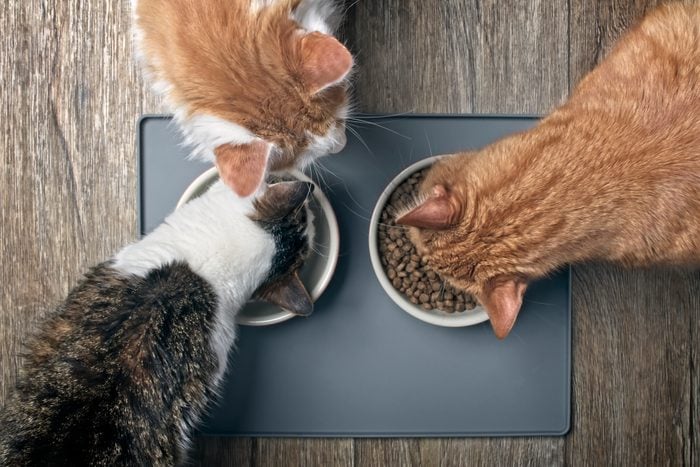If you have a cat, you know that they can be picky about their food. Just don’t try to make them a vegetarian! (It’s actually bad for their health).
Our editors and experts handpick every product we feature. We may earn a commission from your purchases.

Cats need lots of animal-based protein
“While there isn’t a single diet that is ideal for all cats, in general, most do best when they eat foods that are high in moisture and protein and relatively low in carbohydrates,” says Jennifer Coates, DVM, a veterinarian for Chewy. “A study published in 2011 showed that when cats are given access to foods of different protein, fat, and carbohydrate concentrations they tend to self-select a diet that provides them with around 52 percent of their calories from protein, 36 percent from fat, and 12 percent from carbohydrates.” Bottom line—there’s no such thing as a vegetarian cat. Along with feeding your cat the best food, you’ll also want to avoid these 12 common mistakes cat owners make.
Age definitely matters
One of the most important factors to consider when shopping for cat food is your cat’s age. Different life stages mean different activity levels and nutritional needs. For example, kittens are generally far more active than their senior counterparts, and they also need additional nutrition to help them in their quick growing process. “Just as human babies don’t eat the same foods as adult humans, nor should kittens and adult cats eat the same foods since they require different nutrients as they change over the years,” says Brittany Carey, a cat specialist and manager at Cat Safari in San Francisco. “You may see cat food with the phrase ‘for all life stages’ in its description, but it’s best to seek life-stage nutrition.” We bet you never knew these things about your cat!
This high-quality kitten food is grain-free and made with real ingredients, like duck and turkey, and full of moisture and added vitamins and amino acids for a healthy immune system as they grow.


